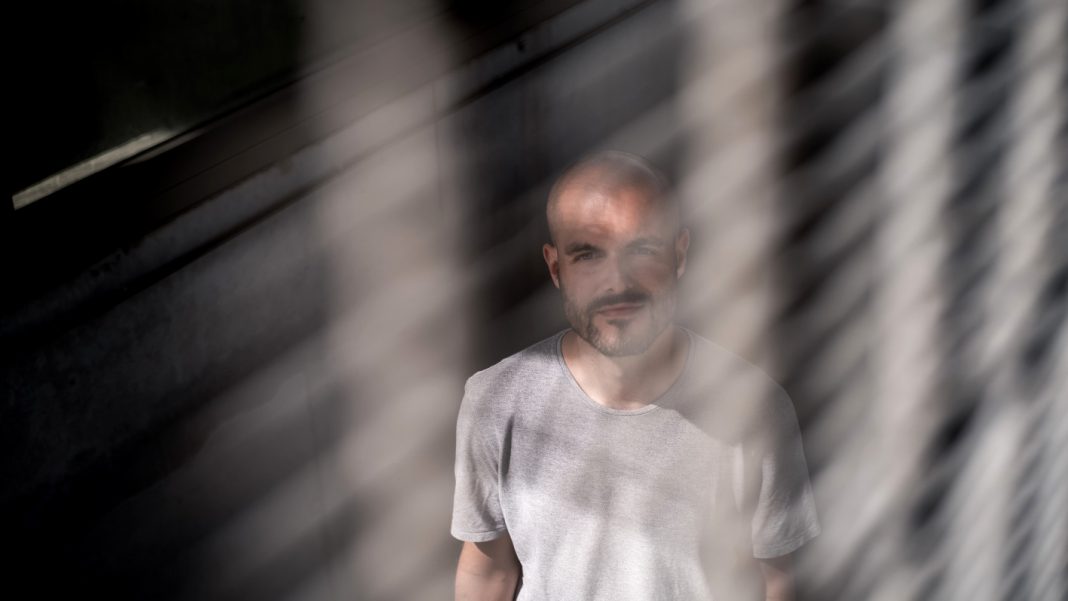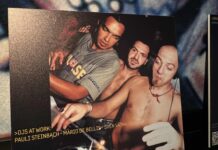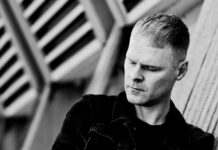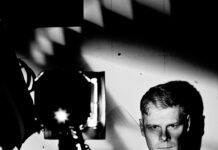
Photo: Press (Kr!z)
Token has easily been one of the most influential techno labels in the past decade. Started in 2007 in Gent, it soon became known for a no-nonsense approach to techno that wasn’t devoid of groove. Its founder Kr!z was known mostly as a DJ before eventually releasing his own material on Token. Having just put out a split single with Pfirter on MindTrip, his contribution to our Groove podcast also features some unreleased material by himself.
First off, how are you doing and what have you been up to?
I’m doing pretty well, thank you. I’ve been enjoying the slower, less hectic way of life and found it quite nice to have a break from everything during the first months of the lockdown. I hardly listened to techno and it took me a while until I wanted to be in my studio again, so these last months haven’t been very productive on that level. Of course I miss DJing a lot, but I also really enjoy having more time at home with my girlfriend and my cats.
You have been running your record label Token for 13 years now and much has changed in these years, with probably even bigger ones ahead as club culture faces an uncertain future. What were the most important shifts you’ve noticed in the scene as a label owner and techno fan, and where do you think – or hope – that things will go within the next few years?
The scene is always evolving. Social media have had a big impact, but „style over substance“ is nothing new. 20 years ago, you also had at least as much fake people in the scene as talented ones. I guess social media just highlights the fakes ones more. Musically, there hasn’t really been any real surprising shift. The genre is always slowly evolving, but simultaneously moves in cycles. After a revival of the classic 90s styled techno, we’re now experiencing a revival of trance, acid and rave. Tempos are faster again. Just like 20 years ago. The change of format from vinyl to digital to streaming is in itself not an important one, but the results of that shift are quite significant. By taking away the financial cost of pressing a record, virtually anyone can put out music. Which is of course a beautiful thing, but the threshold is lower now and that has an impact on the amount of music being released and therefore also the amount of music that probably shouldn’t be released. (laughs) It also makes it harder to sift through tonnes of new music to find something that stands out. Because of the format shift, artists also make less money from sales than they used to make from vinyl and CD sales, which puts more pressure on them to create revenue through DJing. And that results into more DJs that aren’t necessarily DJs. On the other side, technology also gave so many people an easier access to DJing, but as the competition is so fierce and agents and promoters urge them to release records, we now also have a lot more producers that aren’t actually producers, but just DJs making music to have some kind of „DJ calling card.“ So it’s needless to say that the whole „game“ has evolved, for better or worse. For the future I think streaming will get much bigger and I’m sure at some point it will be part of our DJ sets, too. Streaming services tend to focus more on artists than on labels, so I fear the future for labels might be less bright… but let’s wait and see.
Some producers, namely Inigo Kennedy and Ø [Phase], have been with Token from practically the beginning and when Stanislav Tolkachev announced his first EP for the imprint, you pointed out that you had been speaking about working together for almost nine years. Why do you put such an emphasis on long-term collaborations?
Well, I actually meant that Stanislav and me were in contact to do an EP nine years ago, not that it took us nine years to finalise anEP! We had the idea back then, but due to several reasons, it never really materialised and we lost contact a bit. But I do enjoy long term collaborations, yes. I don’t see the label as a business and the artists as „signings“ but for me Token is a platform to release music I like, by people I admire. So when you have a good relationship with people you admire, I think everyone would want to keep that going as long as possible.
Token is fast approaching its 100th catalogue number. Do you have any plans to mark the occasion?
I have some ideas, yes.
You’ve released your first material as a producer on Token’s 10-year anniversary compilation, for which you collaborated with Kennedy and the Danish producer Ctrls on two tracks each. How did these collaborations come about?
I originally wasn’t going to be part of the compilation myself, but due to circumstances out of my control, we had to delay the release date. I was in close contact with Troels (Baunbæk-Knudsen AKA Ctrls) and he had a lot of my early sketches as he was helping me out online quite often with production advice. At some point his comments were progressing more from „this needs a lot of work“ to „this is nice“ and when I found we had some extra time for the compilation, I just asked him if he would want to choose any of the things I sent him to collaborate on for the compilation. I’m still really happy with that track. The original sketch/jam was mine, but Troels really took it to another level. As for the collab with Inigo, we were having troubles with the „new“ deadline, which resulted in me having a smaller share in the final result, but what he did with my parts and what he added to it felt quite epic, so I’m really happy with that one too. It was nice to get my feet wet that way.
Just last year, you’ve followed that up with your debut EP Mantra. You’ve said that you wanted to make music that you’d also play as a DJ. What are the ingredients that were most important to reach that goal when you were in the studio?
I like to find some kind of hypnotic groove, something that makes me move in the studio. It could be something really simple like just a kick and synth line. I try to find something that I can listen to for one hour straight without getting sick of it. Once I have that, I hit record and jam out most of the track live. It’s important to me I get around 90% of the track done in the first two hours. So if I find the right groove, I can make a few tracks a day, but that rarely happens. For my first record specifically it was a process of finally letting go of some music, make final choices. In the end I just booked a mastering session with Matt Colton, who is known to be fully booked months in advance, so it gave me some time – and a lot of stress – to get the tracks ready for that date. I had a lot of music, so I „just“ had to pick the tracks and make a few final tweaks. It was stressful, but I’m happy with how it turned out. I still play those tracks a lot and they work well on a dancefloor.
Earlier this month, you released a split 12″ with Pfirter. What’s your relationship with his music like?
Well, I like it! There’s of course some differences between our music but also a lot of common ground. I like him as a person, too. We became good friends over the years, so the MindTrip EP happened very organically. Just like with Troels in the past, I send tracks regularly to Juan Pablo, to ask for his opinion. He always gives me great advice and encourages me. When I sent him „Imperative Needs,“ I didn’t really have big feelings about it, but he really liked it. After a while he told me he wanted it for his label, which felt really nice. Once I played the track, I saw the potential he saw. After bouncing some ideas back and forth, he decided he wanted to do a split EP. It’s been a fun process, and to see now that the EP is really catching on is a big relief. Having my music on another label definitely felt like a responsibility to me, as someone invested their money in you, so you hope that money is not wasted.
You’ve pointed out that besides techno, hip hop is one of your key influences. Which DJing techniques are the most crucial and how do you apply them in a techno set?
I wouldn’t look at hip hop as an influence, just as something I really love. I listen to it all the time and follow it very closely. I have been collecting hip hop LPs for a long time, too. It only had some influence on my DJing in my early days, about 20 years ago. I used to watch a lot of DMC championship videos and I was trying to learn some of those scratches and different tricks at home. When I first saw Dave Clarke playing at Fuse it all came together for me: he was doing these hip hop tricks with techno records: scratching and beat juggling with two copies of the same record. That had a huge impact on me. I spend a lot of time hunting those same records down and copying his tricks. I just worked my ass off at home to learn and to understand what he was doing. So when I started incorporating that into my own sets, that’s what got me noticed in Belgium. I won a few DJ contests because of that and after that, the first gigs came slowly. At some point I did stop doing those tricks as I got a sick of it. When I first started DJing my main focus and calling card was my technique, much more than substance, the music itself. That focus shifted – probably around the time I started Token – to the actual selection: trying to tell a story with the music you play and take people on a trip. So my style eventually developed more into something where those tricks would mess up the flow I was trying to deliver. Nowadays I’m much more into layering and building grooves than cutting shit up.
What was the idea behind your contribution to our Groove podcast?
I just felt very inspired by the tracks I included. There’s a lot of great music out still, even during this crisis. It felt quite frustrating to not be able to play these tracks in front of a crowd. I don’t DJ at home often to be honest, so I treated the mix as a gig.
Last but not least: what are your plans for the future?
Token is at full speed right now, so I have some exciting plans for that. I also want to release another solo record at some point. The problem is that I have so many tracks that need that last 10% to finish them. I just need to compile a pack with demo tracks, which seems to take me forever. Once I get that together, I will send it to a few labels. I have some tracks in the back of my head for my next Token EP as well, but I’m just taking things very slowly, no rush. And of course I hope to be playing in front of people soon. After four months I’m really starting to miss it.
Stream: Kr!z – Groove Podcast 264
01. Function – Binaural (Eaux)
02. Gabriella Vergilov – The Freak Show (Enemy)
03. Planetary Assault Systems – Huddler’s Source Of Wonder (Break The Silence)
04. Hattori Hanzo – Sword 2 (Modularz)
05. Emily Jeanne – Hàn Ly (Arcing Seas)
06. Oscar Mulero – Evolutionary Decay (Warm Up)
07. Jeff Mills – Self Portrait (Axis)
08. Danny Isola – The Athlete (Isola Tracks)
09. Border One – Nuclide (Token)
10. Troy – YB (Aex)
11. Stanislav Tolkachev – Delayed Gratification (Token)
12. Einox – Klein (Arcing Seas)
13. Svreca – Frue (Sigha Remix) (Semantica)
14. Marie Davidson – Workaholic Paranoid Bitch (Nina Kraviz Remix) (Ninja Tune)
15. Mark Broom – Gunna (Break The Silence)
16. Kr!z – The Nest (unreleased)
17. Kr!z – Malice (MindTrip)
18. Kr!z – Polaris (unreleased)
19. Kike Pravda – Ground (Senoid)
20. Stanislav Tolkachev – There Is No Cure (Token)
21. Mike Parker – Drain Hum (Percussion Mix) (Geophone)
22. Kr!z – Sheppard Moons (unreleased)
23. Function – Compulsive Thinking_ Repetive and Pointless (Tresor)
24. Inigo Kennedy – Chiral Thunder (Voltage)




